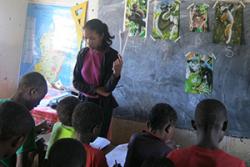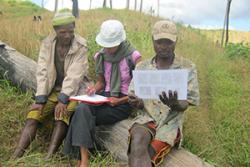Bangor University shows knowledge can travel from children to adults
 Children in east Madagascar learn about lemurs in a school project.A new study by Bangor scientists shows that environmental education can positively influence the knowledge and attitudes of children. The paper, published in the journal Animal Conservation, also shows that knowledge gained by children about lemur conservation can be transferred to their parents
Children in east Madagascar learn about lemurs in a school project.A new study by Bangor scientists shows that environmental education can positively influence the knowledge and attitudes of children. The paper, published in the journal Animal Conservation, also shows that knowledge gained by children about lemur conservation can be transferred to their parents
Sariaka Rakotomamonjy carried out the study in the East Madagascar in collaboration between Bangor University and NGO Madagascar Voakajy. Sariaka received a scholarship from the Student Conference of Conservation Science to work with Dr Julia Jones and Dr Sophie Williams at the University’s School of Environment, Natural Resources and Geography.
A school-based education programme run by Malagasy researchers promoted lemur conservation in Eastern Madagascar. The study assessed knowledge and attitudes of participating children and their parents a year later.
This study show that education programmes aimed at children can also influence parents and increase knowledge about lemurs. But attitudes towards lemurs varied with the species; the aye-aye being considered scary and the eastern lesser bamboo lemur considered a pest.
 Parents respond to the survey a year on.If a child has seen a lemur, they are more likely to have positive attitudes towards lemurs, supporting a widespread belief that direct experience of nature is an important component of improving understanding.
Parents respond to the survey a year on.If a child has seen a lemur, they are more likely to have positive attitudes towards lemurs, supporting a widespread belief that direct experience of nature is an important component of improving understanding.
But common with many high-biodiversity poor countries, Madagascar’s education system lacks sufficient funds to arrange visits to forest areas to view lemurs, even for teachers, and many teachers lack the confidence and knowledge to run effective in-class environmental education. This study emphasises the importance of conservation researchers collaborating with schools to help improve the knowledge and attitudes of children towards their nation’s wildlife.
Dr Sophie Williams said:
“Conservation education in schools is widely promoted by conservationists as a means to improve knowledge of, and attitudes towards local nature by children living in high biodiversity areas. However this is one of the very few studies which evaluate the effectiveness of such programmes. We found that this education programme, run by the Malagasy NGO Madagasikara Voakajy, had a measurable positive effect one year on.”
Dr Julia Jones, senior lecturer in conservation at Bangor University said:
“The Student Conference of Conservation Science bursaries provide a fantastic opportunity for conservation students from low and middle income countries to work with academics in the UK and get specialist training. We were delighted to welcome Sariaka to work with us in Bangor-the forth such SCCS intern we have worked with over the past few years. For her work to have resulted in a paper in such an excellent journal as Animal Conservation is a real achievement.’
Publication date: 14 August 2014
